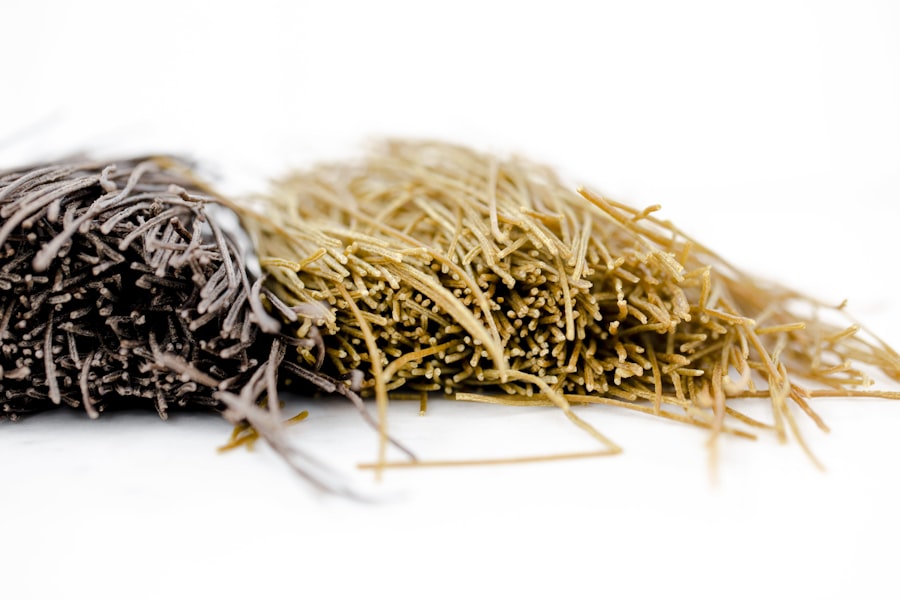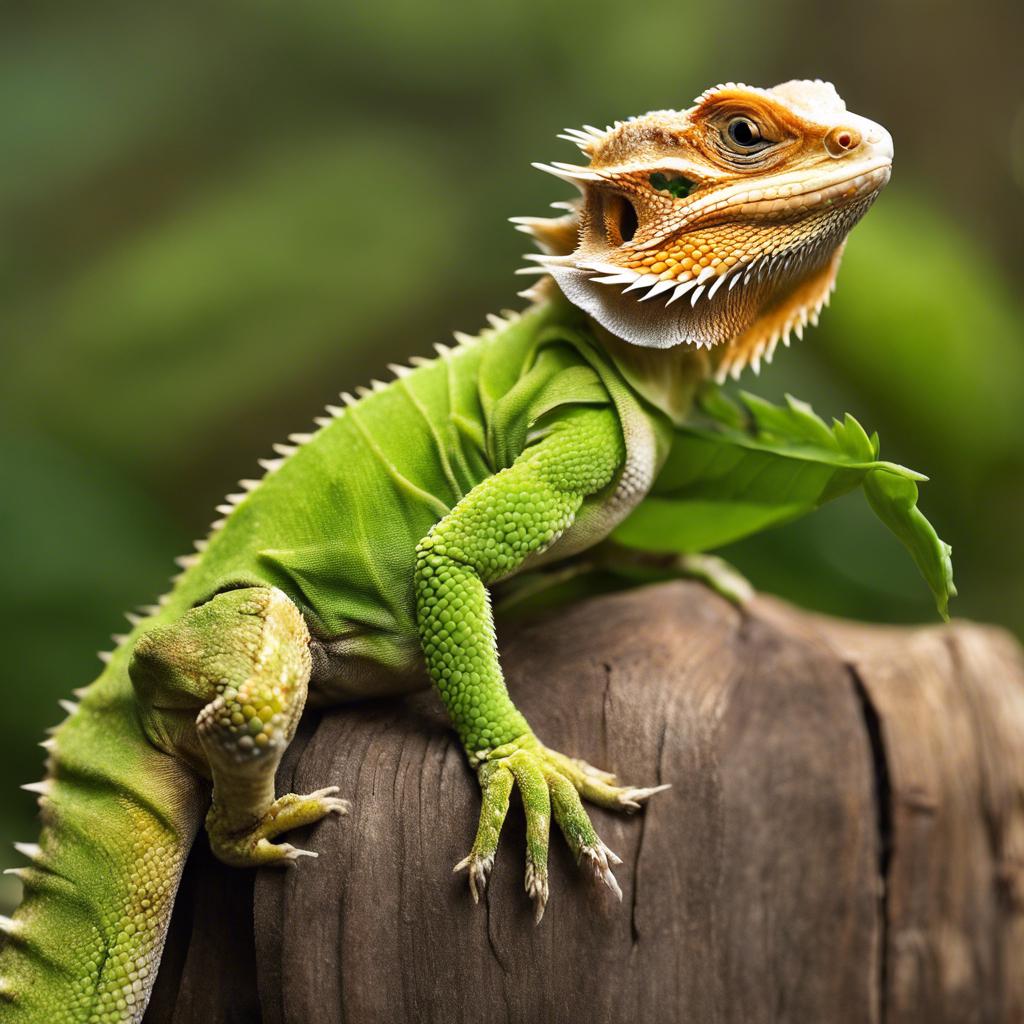Bearded dragons are popular reptile pets known for their unique appearance and docile nature. Native to Australia, these lizards have become increasingly popular as pets due to their friendly demeanor and relatively low maintenance requirements. However, it is important for owners to understand the specific dietary needs of bearded dragons in order to ensure their health and well-being.
Proper nutrition is crucial for the overall health and longevity of bearded dragons. A balanced diet is essential to provide them with the necessary nutrients they need to thrive. In the wild, bearded dragons are omnivorous, meaning they eat a combination of insects, fruits, vegetables, and even small vertebrates. As pets, it is important to replicate this varied diet in order to meet their nutritional needs.
Key Takeaways
- Bearded dragons are popular pets that require a balanced diet to stay healthy.
- Edamame is a type of soybean that is high in protein and other nutrients.
- Edamame can be a healthy addition to a bearded dragon's diet in moderation.
- Feeding too much edamame to bearded dragons can lead to digestive issues and other health problems.
- When preparing edamame for bearded dragons, it should be cooked and served without any seasoning or additives.
Bearded Dragon Diet
In the wild, bearded dragons have a diverse diet that consists of insects, such as crickets and mealworms, as well as a variety of fruits and vegetables. In captivity, it is important to provide a similar range of foods to ensure that they receive all the necessary nutrients.
When it comes to feeding bearded dragons in captivity, there are several types of food that are considered safe and healthy. Insects such as crickets, mealworms, and dubia roaches are excellent sources of protein for bearded dragons. These can be supplemented with a variety of fruits and vegetables, including leafy greens like kale and collard greens, as well as fruits like berries and melons.
What is Edamame?
Edamame is a popular food that originated in East Asia and is made from immature soybeans that are still in their pods. The word “edamame” translates to “beans on branches” in Japanese, which refers to the way the soybeans grow in clusters on the plant.
Edamame is typically consumed by humans by boiling or steaming the pods and then removing the beans from the pods before eating. It is often served as a snack or appetizer and is known for its high protein content and nutty flavor.
Nutritional Value of Edamame
Edamame is a highly nutritious food that is rich in protein, fiber, and various vitamins and minerals. It is an excellent source of plant-based protein, making it a popular choice for vegetarians and vegans. In addition to protein, edamame also contains a good amount of dietary fiber, which can aid in digestion and promote feelings of fullness.
Edamame is also a good source of vitamins and minerals, including vitamin K, folate, iron, and magnesium. Vitamin K is important for blood clotting and bone health, while folate is essential for cell growth and development. Iron is necessary for the production of red blood cells, and magnesium plays a role in muscle function and energy production.
When comparing the nutritional value of edamame to other foods commonly fed to bearded dragons, it is clear that edamame can be a beneficial addition to their diet. It provides a good source of protein, fiber, and various vitamins and minerals that are important for their overall health.
Can Bearded Dragons Eat Edamame?
The answer to whether or not bearded dragons can eat edamame is not a simple yes or no. While edamame can provide some nutritional benefits for bearded dragons, it should only be fed in moderation and as part of a balanced diet.
Bearded dragons are primarily insectivores, meaning their diet should consist mainly of insects. Insects provide essential nutrients such as protein and calcium that are necessary for their growth and development. While edamame does contain protein, it should not replace insects as the main source of protein in their diet.
Additionally, bearded dragons have specific dietary requirements when it comes to calcium and phosphorus ratios. Edamame contains a higher amount of phosphorus compared to calcium, which can disrupt the balance of these minerals in their body. This can lead to metabolic bone disease, a condition that affects the bones and can cause deformities and fractures.
Benefits of Edamame for Bearded Dragons

While edamame should not be a staple food for bearded dragons, it can provide some benefits when fed in moderation. Edamame is a good source of protein, which is important for their growth and development. It can also provide some variety in their diet, which can help prevent boredom and encourage them to eat a wider range of foods.
In addition to protein, edamame also contains dietary fiber, which can aid in digestion and promote healthy bowel movements. The fiber content in edamame can help regulate their digestive system and prevent constipation.
Furthermore, edamame contains various vitamins and minerals that are beneficial for bearded dragons. These include vitamin K, folate, iron, and magnesium. While these nutrients can be obtained from other foods in their diet, adding edamame as an occasional treat can provide an extra boost of these essential nutrients.
Risks of Feeding Edamame to Bearded Dragons
While edamame can provide some benefits for bearded dragons, there are also potential risks associated with feeding it to them. As mentioned earlier, the high phosphorus content in edamame can disrupt the calcium-phosphorus balance in their body, leading to metabolic bone disease.
In addition to the calcium-phosphorus ratio, it is also important to consider the overall nutritional balance of their diet. Feeding too much edamame or relying too heavily on it as a food source can lead to an imbalance of other nutrients as well.
Another potential risk of feeding edamame to bearded dragons is the presence of anti-nutritional factors. Soybeans, which edamame is made from, contain compounds called trypsin inhibitors and phytic acid, which can interfere with digestion and nutrient absorption. While these compounds are typically reduced during the cooking process, it is still important to feed edamame in moderation to minimize the potential negative effects.
How to Prepare Edamame for Bearded Dragons
If you decide to feed edamame to your bearded dragon, it is important to prepare it properly to ensure their safety and well-being. Here is a step-by-step guide on how to prepare edamame for bearded dragons:
1. Choose fresh, organic edamame pods that are free from any signs of mold or damage.
2. Rinse the pods under cold water to remove any dirt or debris.
3. Bring a pot of water to a boil and add a pinch of salt.
4. Add the edamame pods to the boiling water and cook for about 5 minutes, or until they are tender.
5. Drain the cooked edamame pods and rinse them under cold water to cool them down.
6. Remove the beans from the pods by squeezing them out with your fingers.
7. Rinse the beans again under cold water to remove any remaining salt.
8. Serve the edamame beans as a treat or mix them with other foods in their diet.
It is important to note that bearded dragons should only be fed the beans themselves and not the pods. The pods can be difficult for them to digest and may pose a choking hazard.
When serving edamame to your bearded dragon, it is best to offer it as an occasional treat rather than a regular part of their diet. This will help minimize the potential risks associated with feeding edamame and ensure that they receive a balanced diet.
Other Foods to Feed Bearded Dragons
While edamame can provide some nutritional benefits for bearded dragons, it is important to offer a variety of other foods to ensure their overall health and well-being. Here is a list of other foods that are safe and healthy for bearded dragons:
1. Insects: Crickets, mealworms, dubia roaches, and silkworms are all excellent sources of protein for bearded dragons. They should be gut-loaded with nutritious foods before being fed to your pet.
2. Leafy Greens: Kale, collard greens, mustard greens, and dandelion greens are all good choices for leafy greens. These provide essential vitamins and minerals and should make up a significant portion of their diet.
3. Vegetables: Bearded dragons can also eat a variety of vegetables, including bell peppers, carrots, squash, and zucchini. These should be chopped into small pieces to make them easier to eat.
4. Fruits: Bearded dragons can enjoy a variety of fruits as well, including berries, melons, and apples. These should be offered in moderation due to their higher sugar content.
5. Calcium Supplements: Bearded dragons require a good amount of calcium in their diet to support healthy bone growth. Calcium supplements can be dusted onto their food to ensure they are getting enough.
It is important to offer a variety of these foods to provide a balanced diet for your bearded dragon. This will help ensure that they receive all the necessary nutrients they need to thrive.
Bearded Dragon Care and Feeding Guidelines
In conclusion, proper nutrition is crucial for the health and well-being of bearded dragons. While edamame can provide some nutritional benefits, it should only be fed in moderation and as part of a balanced diet.
Bearded dragons require a varied diet that consists mainly of insects, supplemented with a variety of fruits and vegetables. This will ensure that they receive all the necessary nutrients they need to thrive.
When feeding edamame to bearded dragons, it is important to prepare it properly and offer it as an occasional treat. This will help minimize the potential risks associated with feeding edamame and ensure that they receive a balanced diet.
As with any pet, it is important to consult with a veterinarian for specific dietary needs and guidelines for your bearded dragon. They can provide valuable advice and guidance to help you provide the best care possible for your pet. By following proper care and feeding guidelines, you can ensure that your bearded dragon lives a long, healthy, and happy life.
If you're wondering whether bearded dragons can eat edamame, you might find the article “Can Bearded Dragons Eat Edamame?” on Reptile Wizard's blog helpful. This article explores the safety and nutritional value of edamame for bearded dragons, providing insights and recommendations for feeding this popular legume to your reptile companion. To learn more about this topic, click here.
FAQs
What is edamame?
Edamame is a preparation of immature soybeans in the pod, commonly served as a snack or appetizer.
Can bearded dragons eat edamame?
Yes, bearded dragons can eat edamame in moderation as an occasional treat.
Is edamame a good source of nutrition for bearded dragons?
Edamame is a good source of protein, fiber, and vitamins for bearded dragons, but it should not be a staple in their diet.
How should edamame be prepared for bearded dragons?
Edamame should be cooked and shelled before being fed to bearded dragons. Raw or uncooked edamame can be difficult for them to digest.
Can feeding too much edamame be harmful to bearded dragons?
Feeding too much edamame can lead to digestive issues and obesity in bearded dragons. It should only be given as an occasional treat in small amounts.

